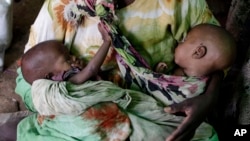One in five twins born in sub-Saharan Africa dies before turning 5, even as infant mortality has dropped sharply for lone babies in the region, scientists said in a new study.
That means about 315,000 sub-Saharan twins die each year before reaching their fifth birthday, the scientists estimated.
The study, published in The Lancet, a British medical journal, drew on first-of-its-kind research into a little-known phenomenon.
Twin deaths largely unnoticed
“So far, the poor fate of twins has gone largely unnoticed,” Christiaan Monden, co-author of the study and a professor at the University of Oxford, said in a statement.
Sub-Saharan Africa is home to the highest rate of natural twin births and the trend of early deaths is alarming, said the team of British and Dutch researchers.
They said sub-Saharan Africa still has the world’s highest mortality rate for children younger than 5, but the number of deaths among lone infants in that category had halved over two decades.
Yet life chances for under-age-5 twins lagged behind, dropping only a third in comparison, they said.
Their study found a mortality rate of 213 per 1,000 pregnancies, compared to 11 per 1,000 in Finland, for example.
Study is first to look at twins
The study, published Wednesday, is the first to examine trends in mortality of twins in the region, The Lancet said.
The researchers analysed data on some 1.7 million children born in 30 sub-Saharan countries between 1995 and 2014. That sample captured the birth of nearly 60,000 twins.
Giving birth to twins in any part of the world carries a higher risk of death than for single-born children, because of a range of factors from congenital problems to early delivery.
But the authors said the gravity of their findings called for policy action, particularly with the number of children younger than 5 in the region expected to grow 20 percent in the coming decade.
They said upping the chances of twin survival need not involve investment in costly equipment.
Detecting twin pregnancies early might facilitate mothers’ access to specialized health care, they said. To increase their chances of survival, twins also could be monitored by medical staff on a continuous basis in early life.
In 2015, the World Health Organization said in a landmark report that children worldwide were half as likely to die before age 5 than they were in 1990. Those under 5 in sub-Saharan Africa were 12 times more likely to die than those in rich countries.





